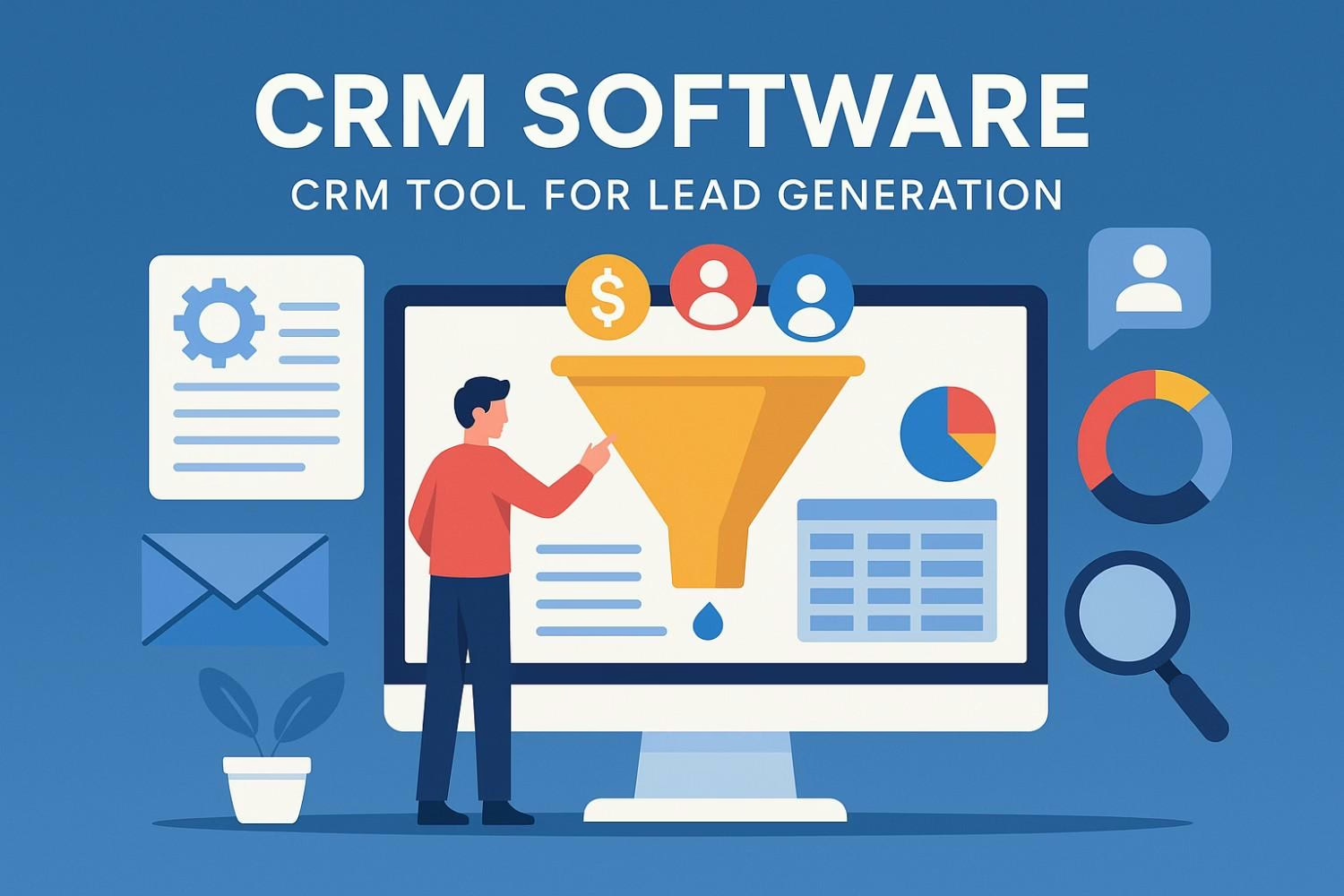Advert Digital Mantra
The Ultimate Guide to CRM Software & CRM Tools for Lead Generation
Introduction to CRM Software & CRM Tools for Lead Generation
In today’s highly competitive business environment, success isn’t just about closing deals – it’s about generating high-quality leads and strategically nurturing them. That’s where CRM tools for lead generation come in. A CRM (customer relationship management) system doesn’t just store contact information – it becomes your leading weapon for capturing, scoring, engaging, and converting potential customers into loyal customers.
What is CRM Software and How Does It Help with Lead Generation?
CRM software is designed to manage customer relationships, streamline sales pipelines, and organize customer data. Its most effective use is as a CRM tool for lead generation, helping businesses efficiently capture, track, and convert leads into paying customers.
The Role of a CRM Tool for Lead Generation
A CRM tool for lead generation automates the process of capturing leads from multiple sources, such as websites, social media, and email campaigns. It scores leads based on engagement and purchase intent, allowing your sales team to focus on the most valuable prospects.
Why CRM Software is Crucial for Businesses in 2025
With increasing competition, businesses need better ways to improve customer relationships. CRM software centralizes customer data, enables personalized marketing campaigns, and provides faster customer support while increasing lead conversion rates.
Types of CRM Tools You Need to Know
Operational CRM for Managing Leads
Helps automate daily sales and marketing tasks while tracking leads across multiple touchpoints. It also provides tools for managing customer interactions, tracking communication history, and automating follow-ups to ensure no leads are overlooked. By streamlining these processes, operational CRMs help sales teams focus on building relationships and closing deals more efficiently.
Analytical CRM for Lead Insights
Analyzes customer behavior and buying patterns to improve lead generation strategies and identify trends that can inform targeted marketing campaigns. By leveraging data-driven insights, analytical CRMs enable businesses to refine their approach, improve customer engagement, and boost conversion rates.
Collaborative CRM for Team-Based Lead Management
Enables sales, marketing, and support teams to share lead data and create seamless customer experiences. Collaborative CRMs foster better communication and coordination across departments, ensuring that all teams are aligned in their efforts to nurture leads and provide exceptional customer service. This unified approach helps businesses deliver personalized experiences, improve customer satisfaction, and ultimately drive long-term loyalty and growth.
“Managing leads manually costs time and sales. A CRM tool for lead generation streamlines the process and helps you close deals faster.”
How a CRM Tool for Lead Generation Boosts Sales
Automated Lead Capture & Scoring
A CRM tools for lead generation automates the capture of leads and ranks them based on conversion potential. This allows sales teams to focus their efforts on high-potential leads, increasing efficiency and conversion rates. Additionally, automated scoring ensures that no valuable leads are overlooked, streamlining the sales process and improving overall productivity.
Personalized Lead Nurturing Campaigns
CRM software helps design targeted email campaigns and personalized offers to effectively engage leads by analyzing lead behavior and preferences. This allows sales teams to deliver the right message at the right time, increasing the chances of conversion. Moreover, personalized nurture campaigns build stronger relationships with leads, building trust and loyalty, which ultimately leads to long-term sales growth.
Data-Driven Decision Making
By analyzing lead data, businesses can create effective strategies to increase ROI and close deals faster, and make informed decisions about resource allocation. Using data insights, companies can identify trends, optimize their sales strategies, and tailor their approach to meet customer needs, which can ultimately lead to growth and increased revenue.

Best CRM Software & Tools for Lead Generation in 2025
Salesforce as a CRM Tool for Lead Generation
Salesforce is one of the most powerful CRM platforms, offering advanced lead scoring, AI-driven insights, and automation. It’s ideal for enterprises that need a scalable solution.
HubSpot CRM for Automated Lead Nurturing
HubSpot CRM is popular for small to medium-sized businesses. Its free version offers robust lead tracking and nurturing capabilities, making it a great entry-level CRM tools for lead generation.
Zoho CRM for Small Businesses
Zoho CRM is budget-friendly yet feature-rich, providing multi-channel lead capture, workflow automation, and AI-driven analytics for small business owners.
Microsoft Dynamics 365 for Enterprises
Microsoft Dynamics integrates seamlessly with other Microsoft tools, offering enterprise-level customization and lead management.
CRM Tools
Here’s a quick snapshot of how these 17 tools stack up against each other in terms of pricing, features, and best use case:

How to Choose the Right CRM Tool for Your Business
Choosing the right CRM isn’t just about the most attractive features – it’s about what best matches your goals and workflow.
Identify Your Sales Process Needs
- Do you need inbound marketing features?
- Is cold calling part of your daily outreach?
- Do you require collaboration across teams?
Map your lead generation journey and look for tools that support every step.
Budget and Pricing Models
Some CRMs offer forever-free plans (HubSpot, Bitrix24), while others are premium (Keap, Salesforce). Set your budget in advance and consider scalability costs as your business grows.
Scalability and Team Collaboration Features
Choose tools that allow you to add team members, assign roles, share notes, and track deals across departments. Scalability ensures your CRM grows as you do.
Benefits of Using CRM Tools for Lead Generation
Integrating a CRM into your sales strategy offers several powerful advantages:
Increased Conversion Rates
CRM tools enable faster, more personalized responses. Leads feel valued and are more likely to convert when outreach is timely and relevant.
Improved Customer Relationships
By storing every email, call, and message, CRMs help you build long-term customer trust. Personal touches like remembering names or past purchases go a long way.
Data-Driven Decision Making
With real-time dashboards and analytics, you can see what works and what doesn’t, allowing you to double down on high-performing lead sources.
Challenges and Common Mistakes to Avoid
While CRMs are powerful, they’re not magic. Mistakes in implementation can hurt more than help.
Over-Automation and Underpersonalization
Automation is helpful, but if every email sounds robotic, you’ll lose prospects. Blend automation with human tone and real conversations.
Ignoring Team Training and Adoption
Don’t assume everyone will just “figure it out.” CRM adoption fails when salespeople don’t know how to use the system effectively. Invest in training.
Choosing Tools Based on Hype Instead of Fit
Just because a CRM is popular doesn’t mean it’s right for your team. Focus on your business model and needs first.
Future Trends in CRM Tools for Lead Generation
AI & Predictive Analytics in Lead Scoring
AI-driven CRM software will predict lead quality, helping businesses focus on high-value prospects with minimal manual effort.
Mobile-First CRM Solutions
With remote work on the rise, mobile CRM tools allow sales teams to manage leads and close deals on the go.
Voice-Activated CRM Assistants
Voice-powered CRM tools will make data entry and lead tracking more efficient, reducing manual workload for sales reps.
CRM Software FAQs
1. What is a CRM tools for lead generation?
2. Can small businesses benefit from CRM software?
3. What features should I look for in a CRM tools?
4. How does CRM software improve customer experience?
5. Is cloud-based CRM better than on-premise?
6. Can CRM tools integrate with email marketing platforms?
Conclusion: Why a CRM Tools for Lead Generation is Essential
In 2025, having the right CRM software is no longer optional—it’s critical for staying competitive. A robust CRM tool for lead generation allows businesses to automate lead capture, nurture prospects, and convert them into loyal customers efficiently. Whether you’re a small business or a large enterprise, investing in the right CRM solution will streamline operations, enhance customer relationships, and boost sales.




